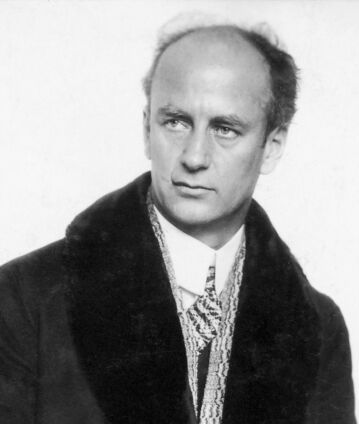威廉·富特文格勒
首席指挥 1922–1934 与 1952–1954
“The deep contradictions of this formidable musician still make his appearance an enigma to me today”, said Michael Gielen in 1996. He was referring to Wilhelm Furtwängler, whose idiosyncratic conducting technique was legendary and demanded the utmost attention and great individual responsibility from the orchestra members. In 1922, at the age of just 36, he became chief conductor of the Berliner Philharmoniker, which he helped to achieve ever greater renown – until 1934, when he resigned for “political reasons” after Hitler and Göring had forbidden him to conduct the premiere of Hindemith’s opera Mathis der Maler.
Wilhelm Furtwängler received a sound musical training at an early age from Anton Beer-Walbrunn, Josef Rheinberger and Max von Schillings, among others. By the age of 17, he had already composed several sonatas, trios and string quartets as well as a symphony in D major, which was premiered in Wrocław in 1904. After the early death of his father, the budding composer decided to pursue a career as a conductor and worked in Munich, Wrocław and Zurich as a répétiteur and choirmaster. Hans Pfitzner engaged him as third kapellmeister at the opera in Strasbourg before he became first kapellmeister in Mannheim in 1915. In 1920, Furtwängler took over from Richard Strauss as conductor of the symphony concerts at the Berlin Opera – and was so successful that he was offered the position as successor to Arthur Nikisch at the helm of the Gewandhaus Orchestra in Leipzig and the Berliner Philharmoniker. In 1931, Furtwängler then took over the direction of the Bayreuth Festival on an equal footing with Arturo Toscanini, and three years later also took over the direction of the Staatsoper Unter den Linden in Berlin. Following the ban on performances of Mathis der Maler, the conductor, who described himself as an apolitical artist, never belonged to the NSDAP, and supported many Jewish musicians, resigned from his position as head of the Berliner Philharmoniker. He was soon conducting concerts with the orchestra again, but without holding any official position. In his – quite controversial – denazification trial, Furtwängler claimed to have remained in Germany to oppose totalitarianism, to preserve German music and to influence Nazi policy in the interests of individual Jews and anti-Nazi artists. He succeeded in convincing the court. In May 1947, he conducted the Berliner Philharmoniker again for the first time at a public concert, and in 1952, the orchestra once again appointed him chief conductor, this time for life. To this day, opinion is divided about Furtwängler’s relationship with the Nazi regime.